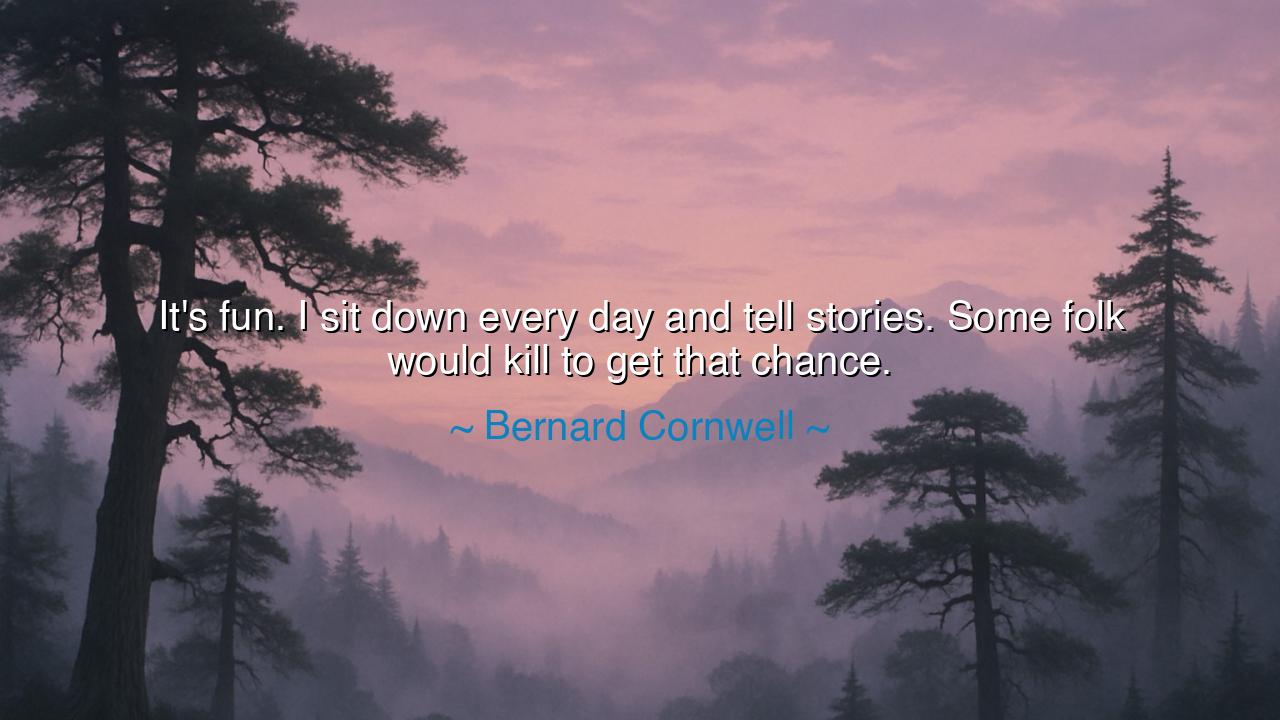
It's fun. I sit down every day and tell stories. Some folk would
It's fun. I sit down every day and tell stories. Some folk would kill to get that chance.






In the heart of every great tale lies a simple yet powerful truth: to tell stories is to shape the world. Bernard Cornwell, a master of weaving historical narratives, once shared a reflection on his craft: "It's fun. I sit down every day and tell stories. Some folk would kill to get that chance." In these words, Cornwell speaks not only of the joy of creation but of the immense privilege that storytelling affords—to sit, day after day, and breathe life into the characters and worlds we imagine. This is not just a profession, but an art that allows one to connect with the past, with humanity, and with the soul of the universe itself.
Since the dawn of civilization, the act of storytelling has been central to the human experience. In the ancient world, the bards of Celtic and Greek traditions were not merely entertainers, but keepers of history, carriers of the values and lessons of the past. The great poet Homer, whose epic tales of The Iliad and The Odyssey continue to resonate through the ages, understood the power of the spoken word. His stories were not just entertainment; they were the bonds that connected generations, the vehicles through which wisdom and culture were transmitted. Much like Cornwell, Homer sat down with his quill or his lyre, weaving stories that would shape the identities of nations. To tell stories, as Cornwell so joyfully acknowledges, is to partake in a sacred tradition, one that transcends time and space.
Consider the story of Aesop, the ancient storyteller who, though enslaved, became one of the most influential figures in history due to his fables. These simple tales, often featuring animals, conveyed profound truths about human nature and morality. Aesop’s ability to craft these stories, to distill wisdom into short, powerful narratives, allowed his words to echo through the centuries. Even today, his fables are taught to children around the world, demonstrating the enduring power of storytelling. Like Cornwell, Aesop found that through stories, one can shape the hearts and minds of many, guiding them through the storms of life.
But storytelling is not just a noble pursuit reserved for those like Homer or Aesop. It is a path open to all, one that Bernard Cornwell invites us to embrace with passion and joy. For many, the chance to tell stories is rare, an opportunity few are given. How many have dreams of sharing their truths, of capturing the essence of human experience in the form of a tale, but find that their voices go unheard, drowned out by the cacophony of the world? Cornwell’s words remind us of the great privilege that comes with this ability: to sit down and craft worlds with words, to create heroes, to explore the deepest reaches of human nature, and to offer our own reflections on the world around us.
The importance of storytelling cannot be overstated. Just as Cornwell sits down each day to craft his tales, we too must understand the power of the stories we tell—not just the grand narratives we might wish to write, but the everyday stories of our lives. Every interaction, every choice, and every moment of reflection is an opportunity to shape a narrative, to offer a perspective that is uniquely our own. The philosopher Plato believed that stories shape the moral fiber of society, and that through storytelling, we transmit not only knowledge but values. Like Cornwell, each of us has the chance to create and share our story, to ensure that our lives contribute meaningfully to the great tapestry of human experience.
The lesson in Cornwell’s words is simple but profound: storytelling is a gift, a powerful tool that connects us to each other and to the past. To embrace the joy of creation, to take the time to reflect, and to share our experiences, is to participate in a tradition that has existed since the beginning of time. Whether we craft tales of historical battles, the quiet struggles of daily life, or the beauty of love and friendship, each story we tell is an opportunity to make an impact, to offer insight, and to connect with others in ways that transcend the limitations of our own immediate experience.
So, dear traveler, as you journey through life, remember that the stories you tell—whether grand or small—are your gift to the world. Tell your story with honesty, with joy, and with purpose, for in each narrative lies the potential to change the course of someone else’s life. Like Bernard Cornwell, find the courage and the excitement in every opportunity to share your perspective, for this is not just a chance—it is your privilege and your legacy. Just as the great storytellers of the past have shaped history with their words, so too can you shape the future, one story at a time.






AAdministratorAdministrator
Welcome, honored guests. Please leave a comment, we will respond soon